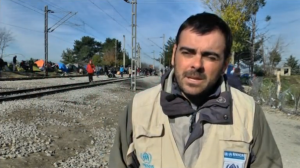 The United Nation authorities will take measures to protect the stranded refugees and immigrants on the Greek border with Macedonia as Iranian refugees’ protest against the border closure continues.
The United Nation authorities will take measures to protect the stranded refugees and immigrants on the Greek border with Macedonia as Iranian refugees’ protest against the border closure continues.
Thousands of refugees and immigrants continued arriving at the Greek-Macedonia border despite that border police may clear the area of anyone not from Iran, Syria or Afghanistan. But most of the immigrants said they were not seeking opportunities in Europe, they were fleeing from the persecution.
Barred from crossing into Macedonia, Iranians protested on the border, many of whom were fleeing oppression from their homeland, forcing riot policemen to arrive at the scene to try and defuse the situation. (Reuters)
Frustration is rising among the refugees who demonstrated strongly by displaying cardboard placards and loudly chanting “Open the border” and “We want freedom”. Policemen formed a human wall in front of the protesters as tensions grew.
Given the tension, the United Nation officers have asked the police to inform them of the specific time of any evacuation of the refugees so that they can take relevant measures to help the refugees.
“We have also requested from the police to inform us on time prior to any evacuation procedure that might take place here,” said Alexandros Voulgaris, director of the Field Operation Unit of the United Nations High Commissioner for Refugees.
However, the officers have not receivied any notice from the police so far.
“At the moment we don’t have any confirmed date or time that such a proceeding could take place,” said Alexandros Voulgaris.
The criterion for the stranded to cross the border should be whether they are refugees or not, according to Alexandros Voulgaris.
“The criterion for people to cross or not cross the border should not be their country of origin, but it should be their profile whether they are refugees or not and their protection needs. So as regards the population, we try to assist all people in need that are here currently,” said Alexandros Voulgaris.
The United Nations will help evacuate the vulnerable refugees to safety and provide legal aid and psychological support.
“We’re just trying to, if I can say, evacuate vulnerable people from the sites and as I said before, refer them to facilities that either they could be hosted for a while and then be provided with a legal aid or psychological support or any other kind of support that they may need,” said Alexandros Voulgaris.







